Gav Thorpe's Blog, page 39
October 22, 2012
Downloading Sanity… 76% complete
As you may have guessed from the complete lack of activity here on Mechanical Hamster, I have been very busy of late. I’d like to say it was because I’ve been blazing away at the keyboard but in reality most of my time has been taken up with getting out and about visiting folks, or getting ready to go out and about, or recovering from going out and about. Throw in some family visits and such, and this week is pretty much the first full week I’ve had to get my head down and work for quite some time.
All of which means that the Horus Heresy novella I’ve been working on, and failed to finish before I went to Australia, has taken nearer two months to finish rather than the 2 or 3 weeks that I had hoped. This was, for the main part, due to a somewhat drastic but necessary deletion of 10,000 words at the 15k mark. I realised the story I was writing really wasn’t going where it needed to and that a lot of nothing much at all was happening.
Usually I tell folks who want to write that they should just get down a first draft no matter what, but it became clearer as my pace slowed to a crawl that something wasn’t working and there was no point in carrying on in the direction I was going. Having to re-evaluate my plans and approach whilst trying to actually write the latest exploits of Corax and his Raven Guard hasn’t been easy with the stop-start time I’ve had but I had a good couple of days last week and another couple of good days this week should see it finished.
But enough of my passing woes, here’s what I’ve been up to.
Fantasycon
This was my first Fantasycon and it was nice to have a little trip down to Brighton. As a newbie I probably should have thrown myself into things a bit more to make the most of the event, but even so it was nice to meet up with some of my fellow Angry Robot authors as well as some familiar faces from other events, and take part in a panel on tie-in writing. It was also nice that some folks came along for my reading from The Crown of the Usurper, even though it was the very last thing on the itinerary for the event, before the BFS Awards ceremony and banquet. A nice little Q&A followed and I hope everyone enjoyed themselves.
BL EXPO
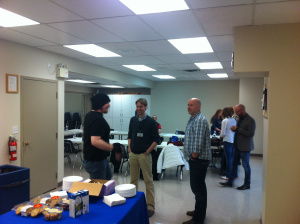
Nervous smiles while tension builds in the ‘Green Room’ as Aaron Dembski-Bowden, Chris Wraight and Graham McNeill all spy the complementary cookies at the same time.
Those who read here often will know that a whole gaggle of Black Library authors descended on Chestermere, Alberta for the Black Library Expo. This was a great event and a fantastic trip all round. A HUGE thanks and hugs go to Gemma for getting everything organised, and along with all of the volunteers and the Chestermere Library board for making us feel so welcome and looking after us so tremendously. I think we are unanimous that this is one of the best events we’ve ever attended.
It was cool to see lots of fans that would otherwise not be able to meet us, and the panels and signings were lively and entertaining. I was also pleased to see some original boks from back in the day, as well as some old but gold Whirte dwarfs (cheers, Dave!) Not only that, we had a wonderful time in Calgary, Chestermere and Banff and I would recommend it to anybody. Hopefully there will be another BL Expo coming along, and it’s certainly worth a few hours on a plane if you’re in North America – it may not be local but it’s certainly closer than the UK!
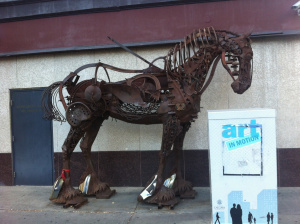
Empire engineers in Calgary?
By complete coincidence, one of the highlights of the visit was an exhibition at the Glenbow museum in Calgary entitled Fairy Tales, Monsters and the Genetic Imagination. Some very idea-provoking images, and I was particularly impressed by the sculptures of Patricia Piccinini.
To finish up, we ventured into the World’s Edge Mountains (sometimes referred to as Banff National Park, but we know better). The scenery can be rightly described as epic. It certainly helped me get into the mood for one of my forthcoming projects – a new Time of Legends title featuring the Dwarfs of the Dragonback Mountains. Just look at these pictures and insert a few huge gates, ramparts and ancestor faces and you’ll be in the same place I was.
Coming Soon
There are still two more events coming up this year – the BL Weekender and an Angry Robot gathering at Sheffield Central Library. If I haven’t seen you yet, hope to see you at one of these!
And a final note. For those of you that like interesting weapons, here’s some Congolese throwing knives I spotted.
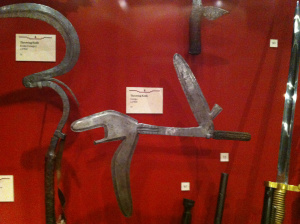
Yes, I did mean throwing knives!
Now where was I? Oh yes, Corax and some devilish Mechanicum engines…


September 13, 2012
Out and About
I’ve just returned from a busy, and all-too-short trip to Australia for Games Day, as well as a couple of Q&A sessions at the Sydney bunker and signings at the Galaxy and Kinokuniya bookstores (signed books on their selves now if you couldn’t attend one of these events). Thanks are due to Mike and Mal from Black Library for being excellent travelling companions and I had a great time meeting fellow authors Henry Zou and Matthew Farrer. Special mention to my good friend Ant ‘Nosebag’ Reynolds, it was great to catch up.
Oz was just the start of a mad couple of months of events and signings, so for those across the globe here is my upcoming itinerary.
Next up is Games Day UK in Birmingham on the 23rd September. Games Workshop’s biggest event, Games Day is usually the most hectic day in my calendar. I can’t say for definite, but I expect there will be pre-release copies of The Sundering available, as well as awesome Path of the Outcast prints (I have to snag one of these to complete my trio).
The following weekend I will be down in Brighton for Fantasycon 2012. It will be my first Fantasycon and I’m looking forward to meeting up with a whole host of folks from the genre fiction world. I’ll be there with my Angry Robot pals, taking part in the packed schedule of signings, readings and panels.
For those on the other side of the Atlantic, the Chestermere Black Library Expo will provide an impressive line-up of authors to poke, prod and question. Taking part over the first weekend in October, the BL expo is going to be one of the hottest Black Library events outside the UK, so for those that can’t make BLLive! or the BLWeekender this might be your best chance to meet and talk to your favourite writers.
Speaking of which, this period continues with the Black Library weekender, taking place in Nottingham on the 3rd & 4th November. A brand new event, this promises to be even better than Black Library Live!, and that’s impressive indeed; exclusive chapbooks, new releases, some titles months ahead of hitting the shelves and more authors than you can shake a big stick at.
Finally, there’s an Angry Robot author event at Sheffield Central library on 17 November 2012. Along with the AR editors I’ll be with David Tallerman and Adam Christopher to talk about things F, SF and WTF.
Dennis and I hope to see you at one of these events, please come and say hello.


August 17, 2012
Trilogy Winner Announced
Thank you all for keeping me entertained while I worked on rewrites for my Ravenwing novel (rewrites being an essential yet mainly thankless task). I asked you all to suggest a comedy title for the fourth book in my series The Crown of the Blood, and you delivered. Quite a few concerned hamsters and other rodents, a couple of them mechanical (though I feel the need to point out that dormouse is spelt, well, like that). Some were downright weird. Some even made me go ‘ewww…’
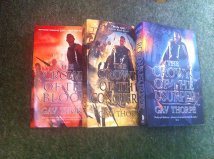
Okay, these aren’t the actual ones I’ll send out. One’s an ARC, as you can clearly see, and I’m not going to inflict my pre-edit typos on anybody.
In the end the biggest chuckle was garnered by…
[[[INSERT YOUR OWN DRUM ROLL HERE]]]
The Crown of the Soldier Who took an Arrow to the Knee.
Tired meme or genius, you decide. Actually, don’t. I’ve already decided, because it’s my competition. “I used to be king of Askhor but then I took an arrow to the knee,” would make a great opening line of dialogue. If you don’t get it, don’t worry you just haven’t played Skyrim, there’s no big conspiracy.
If TroubledScribe would like to get in touch via the hamstertubes – mechanicalhamster [at] gmail [dot] com – we can get the books on their merry way.
Thanks to everyone for joining in the fun. If you’re quick, you may be able to take part in the Fallen Princes blog giveaway. If you’re not quick, you can always win a copy by going to the Robot Trading Company and simply paying money (what could be easier?).
Cheerio.


August 8, 2012
Crown of the Competition
In case I haven’t mentioned it yet, volume three in The Crown of the Blood is now available. The Crown of the Usurper wraps up the exploits of Ullsaard and his friends/ enemies, but if you haven’t started the series yet here’s a great chance to get in on the (giant cat-riding, dinosaur-punching, back-stabbing) action.
It’s competition time and on offer is a set of the complete trilogy. That’s three books, more than 400,000 words for you to enjoy.
What do you have to do?
Simply reply in the comments section with your suggestion for a (purely hypothetical) fourth book in the series – “Crown of the…?” The one that makes me laugh the most gets the prize. Easy-peasy.


August 2, 2012
Start at the End
This week sees the release of The Crown of the Usurper, the concluding volume in The Crown of the Blood trilogy.
[PLUG - available now from all good bookstores and at a great discount via the Robot Trading Company]
This is the culmination of work that started four years ago (possibly longer). Of course, it hasn’t taken me four years just to write the one book – that’s a surefire way to leave the bills unpaid. However, the end of this book is actually one of the first things I envisaged for the series. Even though I didn’t know the specifics, and the details have changed a bit as the series has unfolded, the concluding part of the story – the whole point of the story – was set from the moment I started to think about Ullsaard and his journey.
Creating a Target
The ending of a story or novel is the climax, the pinnacle to which the narrative has been driving, whether it’s the twist one-liner at the conclusion of a 500-word piece of flash fiction or the finish of a ten-volume epic, the ending maketh the story. One way or another, the ending is the goal towards which the reader has been striving, and so it makes sense that it is given the highest priority by the writer.
In Screenwriting 101: The Essential Craft of Feature Film Writing, Neill D. Hicks describes the basic 3-act story structure as attraction-anticipation-satisfaction. Put simply, the opening hooks in the reader (in the case of prose), the middle carries them on an interesting journey that sets up the ending, and the conclusion delivers on the anticipation created. Occasionally this can be subverted or rearranged in terms of the structure of the narrative, but all-in-all an unsatisfying ending is more likely to create a negative opinion of a piece than a shonky beginning. Readers will forgive a clumsy or slow start if the story pays out later. They will rarely recommend a story that delivers well throughout but then fails to satisfy with the ending.
As the ending is one of the most critical aspects of a story it must be at the forefront of the planning and writing process. If you don’t know where the story is going, how are you going to work out how to get there. The ending encompasses the themes of the work, and while it may not tie up all the threads (or any at all, like Lost or the Sopranos) to must still somehow satisfy the reader narratively. It has to feel right. It has to end properly in the context of the rest of the story.
Stay on Target
By having a well-established ending, in principle if not in detail, the story can work towards that point. When you consider that there are more than 400,000 words between the opening of The Crown of the Blood and the final sentence of The Crown of the Usurper, you realise how important this is. All sorts of things have changed with the narrative inbetween – the character journeys, the setting and the plot have all been warped along the way – but fundamentally the story has been moving towards that fixed end.
In retrospect, hopefully the reader feels that the story could not have ended any other way. All they have learnt, all they have shared with the characters have drawn them along towards the inevitable conclusion, whether that leaves them elated or sad, smiling or crying.
The Winding Road
Another huge benefit of having a firmly-realised ending in place is that it actually gives you more freedom, not less. Contradictory? ‘Surely,’ says some hypothetical, slightly hippy would-be writer, ‘I want to just let my creativity flow, man. I want the characters to show the way, dude. That’s, like, so square, man.’
I bet that than a good proportion of people who want to be writers have begun loads of stories. The list of opening lines, first chapters, perhaps even half-completed manuscripts would be endless. To quote someone whom I cannot remember at the moment, ‘Writers write; authors finish.’ The reason so many projects stall? The writer hasn’t thought enough about how the story will end. It is so easy to get bogged down in sub-plots, characters development and setting that one loses one’s way and realises that 40,000 words have been expended going nowhere at all!
By knowing exactly how my trilogy was going to end, I was able to relax, enjoy the diversions created by my characters’ actions and deal with unseen ideas and events without ever feeling I was getting lost. Sometimes it gave me a heads-up that I was over-indulging certain secondary characters, or I would know that an interesting little sub-plot was just filler, or a scene was leaving me in a place that was too far off-course. Occasionally I had to stop and take a day or two to work out how I was going to wrestle things back on track; at least I knew that they needed to be brought into line.
Finish on the Theme
I’ve said before that all stories are about something. If you describe your story simply as a list of characters and actions, rather than a theme or themes being explored, it will lack a certain something. The ending rounds out the theme and should be informed by it. If your theme is ‘triumph over adversity’the ending better well be triumphant – even a simple ‘…and they all lived happily ever after’ will suffice. If your theme is the pointlessness of resisting the encroaching power of the corporations, the power of the corporations better damn well still be encroaching at the end, even if your protagonist has won a personal victory along the way.
If you cannot figure out the end of the story, it is because you haven’t yet figured out what the story is about. If, on the other hand, you do have an ending, be sure it fits with the rest of the narrative. It can be the bleakest, wrist-slitting conclusion ever or the shiniest kind of Hollywood ending, but it needs to make sense to the reader and be consistent with everything that has gone before.
Start at the end and work backwards and you’ll have a story that is much tighter throughout.
Additional Note
Of course, the trick with a trilogy or ongoing series is to make sure that each individual title has a satisfying ending, even if it also serves as the ‘attraction’ part of the next volume. So often trilogies suffer from ‘middle book’ syndrome, and I find longer series to be even worse. I’m not going to sit through 500+ pages of prose that turns out to be nothing more than set-up for the next volume and be happy at the end.


July 19, 2012
Expos, eh?
Many of you will already know that at the start of October I will be heading to lovely Chestermere in Alberta, Canada with seven other Black Library authors.

And by ‘lovely’, I mean ‘stunning’.
Why? It’s the inaugural Chestermere Public Library Black Library Expo, of course!
If you’re in North America and you’ve jealously read reports from past Black Library Live! events, or perhaps can’t afford to come to the UK for the BLWeekender, there’s going to be no better chance to spend many hours with the top BL writers and editors (and me…). And all in a wonderful location.
Seriously, come along if you need any inspiration for fantasy landscapes as well as writing advice or just to see the latest releases (and probably a few pre-releases).
As part of the build-up to the Expo there will be numerous interviews with different folks. My first is with the organiser, Gemma, at the Expo homepage.
On top of that, 3 1/2 of the authors attending the Expo dropped in (via Skype) to talk to the fellas at 40kRadio.
There will be more to come so be sure to keep up with the news here, on my Twitter feed, facebook or the expo website. I’ll be posting a bit more about the schedule and the panels closer to the date (in other words, when they have been decided). If there are any topics you think should be included, why not drop me a comment?


July 13, 2012
Hang on lads, I’ve got an idea…
A question that often gets asked when people learn that I‘m an author is “Where do you get your ideas from?” It’s a good question, but also an awkward one. It implies that ideas are difficult to come by, but in my experience that is not the case. Ideas are everywhere, liberally sprinkled into my brain by the Ideas Fairy on a constant basis.
I can imagine worlds and characters and plots, but I can’t imagine what it is like to go through life without having lots of ideas. Everything is an inspiration.
Ideas are not the problem. The difficulty comes when I have to decide what to do with them. Characters, scenes, lines of dialogue spring to mind at the most inopportune moments. Sometimes they need to be written down, sometimes they need to be left to percolate and mature, seeking the correct venue for expression.
Glimpses of stories-to-be, of worlds unexplored and scenes to be written, are one of the biggest dangers for me, distracting me from whatever work is one hand.
The trick with ideas is not coming up with them, it is coming up with the right ideas at the right time. The majority of my work – Black Library – requires ideas-on-demand. The bare bones of a story or novel – who, what and where – can be relatively straightforward. What requires creativity is how to present the ideas, blend them together into a narrative and release their nascent potential.
With that in mind here are a few ways I get ideas.
That Looks Cool
When I started out, my ideas process was heavily focussed on the visual. It still is to a certain extent, but tempered with more experience of narrative and drama. Usually a scene or a thing or place will come to mind, jolted into being by something I read in a history book or see on the news or witness as I’m out and about.
I suppose that a lot of this has to do with my background working on miniatures with Games Workshop. My teenage years and early professional life have been geared towards striking visuals, whether a stunning character type, fantastic vista or an image of strange worlds and battles. The attraction of sci-fi and fantasy is being able to explore the otherworldly in terms of the visual, painting pictures with words that set free the reader’s imagination.
A particular view, perhaps ordinary or perhaps amazing, can make the gears start to turn. An old tower, a person in the street, a photo of somewhere you’ve never been can all settle into the mind and start to grow. You might be inspired by a particularly impressive beard, or see a cloud formation that puts you in mind of an ethereal starship. Whatever it is, go with it. Follow the visual impetus to its conclusion and start to populate the scene with people, start to flesh out the character with personality.
At this point you are brainstorming in a group of one, and the same principles apply. Don’t examine the image too closely yet. Don’t think about how something might work, but just embrace the visual aspects, noting your emotional response as much as the details itself. Are you scared or elated, anxious or excited? Does the person frighten you or seem friendly? Take a snapshot in your mind and then return to it later, exaggerating features, adding blemishes and flourishes, twisting the reality to become something more, something hyper-real.
I am, at heart, something of a frustrated artist. At school I planned to become an illustrator but lacking the necessary skills and the desire to spend several more years in education to learn them, I turned to writing instead. It is something that, when i have more time in the future perhaps, I would like to revisit. The problem is, having worked with some of the best artists and illustrators around, my meagre efforts are shown for what they are and the ideas cannot be properly realised by my fumbling artistic efforts.
That leaves the written word. Sometimes prose can convey beauty and terror in a way no other medium can, but often once a visual idea is rendered into words it becomes mundane, prosaic. I am now in the place where I try to convey the sense of a place or person and leave the rest to the reader, rather than trying to labour on the description, sucking the life out of the image. Unlike film-making, illustration, comics and other visual media, writing allows me to deliberately leave the details to the imagination of the reader. I’ve become less concerned with conveying the particular visual in my head, and instead hope that the reader conjures up the scene for themselves that gives them a similar response, whether awesome and grandiose, or squalid and mean.
Say What?
Another important part of the ideas process is lines of dialogue. A scene, even a whole book, can sometimes live or die by that one killer line that hooks int he reader or gives them the narrative satisfaction they have been craving.
Of late this has been the bulk of my ideas because I’ve been working on short stories and scripts destined to become audio dramas. Someone very recently quoted a favourite line from Raven’s Flight on my Facebook page – “Do you really think I need a bodyguard?” – and it is that sort of response that gives me great reward as a writer.
The dialogue may be a pithy one-liner like the one just quoted, or a long oratory that sums up the entire character or narrative. Reading Theoden’s speech before Pelennor Fields – and listening to the heart-stirring rendition in the LOTR films – chokes me up every time.
Dialogue is the means by which the characters talk to us, and though much of it has a mundane purpose, it has the power to make us laugh, cry, be fearful or triumphant. If I come up with what I consider to be a ‘killer line’, the narrative process then becomes a matter of finding the venue for it to be said. A whole plot can end up revolving around the delivery of that line, its utterance being the beginning or culmination of the story.
Revelation
Twists and revelations are the bread and butter of dramatic fiction, whether plot- or character-based. The turning point of a narrative is quite often tied up with a seismic shift in the outlook of the character or their situation.
These ideas usually germinate as ‘what if?’ scenarios. What if a space marine absolutely has to team up with an ork to complete his mission? What if the antagonist our character has been striving against all of this time turns out to be an ally? What if, counter to narrative determinism, our character runs out of bullets at the crucial time or doesn’t have the money to jump in the cab?
Revelation is about the break from the norm, messing with the reader’s expectations. In order for a revelatory idea to work the status quo has to be firmly established previously. The job is about presenting the revelation in such a way that it fills natural while not being signposted throughout the story.
Revelation is more than just about a twist ending or narrative bait-and-switch. It needs to reveal something about the characters and/ or the world that inhabit that profoundly affects the expectations that have already been created in the reader. It must elicit a strong response, positively or negatively, in order to become more than just a gimmick. With a bit of luck, it might even have the reader questioning what else they know, about the story or the real world.
Answering the Questions
Writing in a shared universe brings its own source of ideas. Many come from extant background material – the entire Space Marine Battles range, for example – but it is also as much about the things that have not yet been written or illustrated. Delving into unexplored parts of the mythos is one of the reasons I love writing for Black Library.
Often a trigger for an idea will be a question or discussion on a forum. Someone might innocently ask “Do Eldar wear socks?” and there is no obvious answer. Writing a story or novel gives me the opportunity to address those sorts of questions.
Okay, maybe not about Eldar socks.
But there are huge gaps in the established backgrounds, simply because some questions aren’t suitable for answering in products designed to support a tabletop wargame – they are too domestic or cultural or otherwise irrelevant to the business of waging giant battles – or simply because the universes are so big there is not room to address every issue in minute detail.
These questions might just form part of the background hubbub of a novel, mentioned in passing to add colour to a scene or plot point. They can also be the propellant for a large part of the narrative. It all depends on the nature and scope of the question. Big questions need big answers. What would happen if the Imperium attacked an Eldar craftworld? That’s a big question, and forms the climax to my Eldar Path books. What were the Dark Angels doing during the Horus Heresy? A truly massive question requiring many books to answer. Was Malekith evil all along? Let’s see if we can make readers decide for themselves.
There are also the questions that come from within. What drives a woman to kill her husband? How would a tale unfold if the lead character was blind? Does predestination exist? Does magic cause as much harm as it does good? When you start answering questions like this, you have a theme for your story, and a theme is the most important part, even if nobody else isever aware of it. Without a theme, without a purpose, a story is just a bunch of things happening.
The Ideas Fairy Cometh
The inspiration for ideas is all around us if we have our eyes and ears open to the Ideas Fairy. She comes and goes on a whim, but she never leaves for good.
For those who want to do some writing of their own but think that somehow the right ideas never come, just remember the topics I’ve covered here. Think about the visuals of the characters and the setting and how that influences the story – what exotic places do you want to take the reader? What jaw-dropping lines of dialogue will amuse and astound the reader? What revelations will you unveil to challenge their emotions and intellect? What questions, about your characters, their universe and the real world, do you hope to explore and perhaps even answer?








June 26, 2012
More Blood!
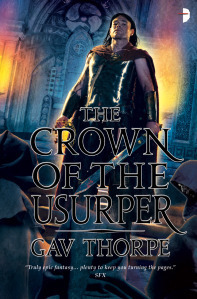
Ullsaard – now with added hair.
Or to be more precise, more The Crown of the Blood. Released in August, The Crown of the Usurper is the conclusion to the trilogy and I can promise more battles, more dinosaurs, more giant cats, more otherworldly priests, more pan-dimensional beings and more backstabbing.
An extract is now available at the Angry Robot site.
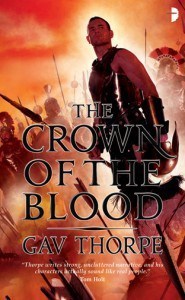 If you have not yet read the first two books, I suggest you get them now from the Robot Trading Company or your nearest bookseller.
If you have not yet read the first two books, I suggest you get them now from the Robot Trading Company or your nearest bookseller.








June 14, 2012
Short Story Giveaway Madness Bonanza!
I think it encapsulates a certain hopelessness we all feel when confronted by broken technology – the same technology we now employ to elicit aid when things go wrong. Enjoy.
Incidentally, I eventually fixed the problem by wiggling the antenna things on the network adapter. Old skool is still cool. The icon on my screen tells me I have no connection. Don’t be fooled by everything you see, though part of me suspects this will be unpostable by the time I have finished typing.
Update – As I feared, it all went wrong again before I could post. So, another day later, here we go again…
Update- Two days later, this will hopefully work. Seems my WordPress problems have been Firefox-related, let’s see if Explorer works.
DRIVER NOT FOUND
By Gav Thorpe
The incessant beeping of the alarm signal inside his head roused Luther Green from the semi-slumber he had been enjoying. A bright summer morning forced its way through the thin curtains across the window of his small bedroom. With a groan he sent the shutoff signal and pushed back the covers. Even as he swung his legs free of the bed linen the alarm signal sounded again and with a snarl he sent the shutoff once more.
Having dragged on a pair of jox from where he had discarded them on the threadbare carpet the night before, Luther rubbed his eyes and staggered towards the door while he accessed his synmail. Or at least, he tried to.
NON-LOAD FUNCTION ERROR
The message blinked into his true-consciousness and then faded into his memory short-slot. With a sigh, he ambled out of the door and into the bathroom to the left. He peered at himself in the mirror, noting the extra wrinkles around his eyes. Last night’s drinking session had not been heavy, but at forty-two he knew he couldn’t live it up like he used to.
Plucking the sonibrush from its charger he began to clean his teeth whilst resubmitting the access login for his synmail.
NON-LOAD FUNCTION ERROR
Luther spat venomously into the sink and rammed the brush back into its holder. He called up the datalog as he made his way downstairs and into the kitchen. Everything seemed as it should be. His brainload upfile had gone through without incident while he had slept. Perhaps it was a signal problem.
Turning on the autocaff, Luther slumped into the solitary wooden chair next to his small breakfast table and dialled up the BBC News channel.
CHANNEL NOT FOUND
Luther was frustrated now. He tried several other channel-feeds and came up with the same notification. The gurgle of the coffee machine distracted him for a moment and he stood up to take the steaming mug from its little alcove. As he did so, Luther glanced out of the narrow window at the brain-net antenna that soared up from the building opposite. The tall, dish-covered mast looked fine. The weather was bright and clear and there’d been no storm as far as he could remember. The signal should be strong. He tried his synmail again without success.
A worrying thought struck Luther. What if it was a hardware problem? His synaptic terminal was over a month old now; virtually ancient in the fast-moving world of the Nebulous Neural Net. Still, he expected his connection to be a few milliseconds slow, not completely defunct.
He decided he should get dressed, before he got hung up on diagnostics and endless wild digital goose chases. Coffee in hand he made his way upstairs. Luther was unsettled not just by the thought that he might have to fork out another few thousand pounds for a new receiver, but also by a sudden sense of isolation. Without his neurolink he was shut off from all information – friends, the company, the wider world. More than anything, it was bloody irritating.
As well as another try of the synmail, he attempted to access his neuroscape board, the NNN upload site and a number of other community access points to which he was subscribed. Different error messages scrolled through his mind’s eye, but they all boiled down to the same thing: no entry.
Distracted, he threw on yesterday’s t-shirt and jubs and walked downstairs with more purpose. He was halfway down the stairs when he realised he had left his coffee in the bedroom.
Turning to go back for it, he felt a sudden flash of connectivity. The receiver signal bar turned green for perhaps fifty milliseconds and then reverted to the dull red it had been since he had awoken. Luther stopped in his tracks and sent the connect algorithm again and again for almost a minute, hoping that whatever glitch was plaguing him would be circumnavigated by sheer persistence. It wasn’t.
Having retrieved his coffee Luther settled down in the tattered mock-leather armchair in his lounge. Thus ensconced in his favourite place he set about diagnosing exactly what the problem was. He ran through the hardware checks and everything seemed to be working fine. The loopback signal test came back as positive, indicating that the NNN carrier wave was indeed being transmitted from the antenna outside.
He tried his synmail again, just in case he could catch by surprise whatever malignant software bug it was that vexed him. Despite such resourceful trickery the synmail failed to load.
For the next thirteen minutes and twenty-six seconds Luther ran through more checks and verifications, including resetting his neurotrans three times and rebooting the synaptic analogue. Nothing seemed to work. Finally he went through each of his implants one by one, checking their version numbers against the software drivers he had installed.
Another twenty-three minutes and fourteen seconds of investigation revealed the anomaly. Last night’s update had erroneously imposed the 3.2.1 driver on his cortical link, which needed 3.2.3. He couldn’t fathom why the download would do such a thing; it was automated direct from Microsoft Neurohub.
Then he caught himself. Of course it was entirely possible that the automatic download was messed up. It was just like the time that it had missed out the version update on his SkyWeb subscription and he’d missed four hours of his favourite sitcom. Then there was the time his location filter had been de-synched and the pizzabot had taken his order to a flat three floors above. Or the time…
He realised that recounting past corporate cock-ups was not going to fix his present situation. All he had to do was rollback the version driver to the last one that had worked. Except, he remembered with a snarl, he had submitted for automatic backup on his downloads after getting bored authorising them every morning when he woke up. There was no rollback driver to install.
Finishing his coffee, Luther tried to work out what he could do. The problem was that he really didn’t have much of a clue about the various implants that were stuffed into his head. He wasn’t a technician, or for that matter much of an educated enthusiast. He’d bought each upgrade and new brain peripheral as they’d come out, just like everybody else. He wished he had paid more attention and at least completed the tutorials.
If anything but the receiver had gone wrong he could have manually reinstalled the data from off the neurohub, but without a connection that was impossible. It was the same thing with hooking up to a helpdesk: no signal, no contact.
The more he thought about it, the angrier Luther became. Of all the things he had hoped to do on his day off, mucking about with his synware was the last. He’d envisaged a morning spent channel-surfing and relaxing in his underpants. He’d also planned to dial up Marko and some of his less-employed friends to see if they fancied spending the afternoon in an Omega Wars 3 group-sesh. Now he was going to spend ages sorting out this mess.
Resisting the urge to hurl his coffee mug across the room, Luther tried to link with his synmail again. It didn’t work. Whatever the solution was, it wasn’t going to be sitting here and hoping the problem might fix itself.
He’d have to go out. That would mean getting showered and dressed properly. Luther didn’t care for that idea; it was his day off. Still, he resigned himself to the thought and hauled himself out of the armchair, ready for action.
He stopped. His anger was replaced by doubt, which quickly became a gnawing fear the more he thought about the situation.
Where would he go? Who did you go to see about a signal problem? His implants had all been autodelivered from who knew where and software was always downloaded straight from the grid. Was there even such a place he could visit?
Another realisation trickled coldly into his thoughts: how would he get there? He couldn’t dial-up a cab because he didn’t have a signal. Even if he went out and was lucky enough to catch one close at hand he had no way to make the credit transfer to pay for it.
He needed help from someone else. He couldn’t sort out this problem on his own.
Having thus deferred any real course of action for the moment, he put the mug in the cleanser and went upstairs to get himself ready for public view.
Seven minutes and sixteen seconds later Luther strode downstairs with more purpose, invigorated by the vibro-shower. He made himself another coffee and stood at the kitchen window sipping at it while he decided who he should call on. He was on pretty good terms with his next door neighbours on each side, but they would both be out at work by now. There was a young family just down the hall, maybe one of them would be in. The prospect of having to talk to a comparative stranger turned a tight knot in Luther’s stomach. He wasn’t good with people he didn’t know.
Still, there was nothing for it unless he was going to spend the rest of his life sat in his flat slowly withering away. Gritting his teeth at the potential humiliation awaiting him, Luther pulled on his coat and headed out of the flat.
The snick of the lock behind him was like a deafening crack as he realised the tenantscan wouldn’t let him back in again without getting his id-broadcast. Now that he was out of the flat, he wouldn’t be able to get back in until he got his problem fixed. He was stuck outside.
Luther kicked the door hard and pain lanced through his foot. Oddly enough, the sensation wasn’t entirely unpleasant. Since he’d woken up his mind had been empty of all input; devoid of noise except for the gurgle of the coffee machine and robbed of all sensation except for the caffeine and the shower.
The feeling of isolation returned as the throbbing in Luther’s foot subsided. He couldn’t call his friends. He couldn’t get in touch with work. He couldn’t dial up a map or directory to find somewhere to go. He couldn’t order food, pay any transactions, get any news. Nothing.
Panicked, Luther hurried along the whitewashed hallway and stood at the door a little way down. Again, without a signal he couldn’t activate the caller-id. How was he going to let the family inside know he was there?
He decided that if he banged his hand on the door it might attract attention. After twelve seconds of pounding, the door clicked open to reveal a young woman with curly blond hair, a small child cradled in her arms. Wires linked the babe to its mother from the back of its neck to her temple-socket. It was sweet in a way and Luther smiled at the sight, the thought mirrored by a cute emoticon surfacing in his brainware. He briefly remembered what it was like when he had been fitted with hard-pointss as a child. His dad had stopped him going wireless until he was eight even though most of his friends had dropped their cables when they were six. It had seemed so unfair at the time. Now Luther wished dearly that he still had that clumsy, physical node to connect with.
The woman looked at him with a suspicious frown, holding the baby away from the door with unconscious protective instinct.
Luther realised she’d probably been signalling him for the last few seconds and was now wondering why he didn’t reply. Even his short-band personal chat-sig had been messed up by the driver glitch. He pointed to his head and then made a chopping motion with his hand, trying to indicate to the woman what was wrong. Her frown deepened and she moved to close the door. Luther jammed his foot in the way with a pleading look and jabbed a finger towards his skull and shook his head. The woman’s eyes now widened in fear and she kicked him hard in the shin, forcing him to withdraw his foot. The door slammed shut.
Luther hoped that the young mum was scared enough to tab an alarm to the block’s security officers. They would come to investigate and then Luther would be able to explain the problem. If he got the chance, a small, scared part of his mind pointed out. They might just as likely turn up expecting some armed serial rapist, broadcasting surrender messages that he wouldn’t pick up. It would look like he was resisting and they’d shoot him dead. Possibly.
How likely was that to happen? It didn’t really matter, Luther decided. Even if the chances were slim, when you were dead you were dead. It would be little comfort to his cooling body that events had gone against the odds.
Deciding that a confrontation with the rent-a-cops was not a good idea, Luther jogged further down the corridor to the elevator. At least there was one benefit to living in this crappy block of flats – the lift still had an old-fashioned touchpad as well as a signal receiver. He stabbed the third access level into the keypad and waited for the car to arrive.
There was still no sign of any security guards when the doors wheezed open. With a quick glance each way along the corridor, he stepped inside. As before, the gentle hum of the elevator was comforting, reassuring. It was sensation that he could assimilate, something the whirling, hi-func parts of his souped-up brain could be kept busy processing. He listened to the little rattles and squeaks, the near-inaudible scratching of cables.
The lift took seven seconds to reach the third access level. Luther poked his head out to check the landing for guards and then stepped into the hallway. The wide landing was covered by a glass canopy and the sun bathed the concrete plaza. Sweat prickled on Luther’s brow as soon as he stepped out from the air-conditioned climate of the main building. It had been a while since he had actually felt the sun. Obviously, every time he went out, it was there, when the storms weren’t unleashing their fury upon Britain. It had always been something annoying; a means of creating unwanted sweat between door and cab, between cab and door. His mind had been elsewhere, on the vast playgrounds and media thoroughfares of the neuronet.
He couldn’t remember the last time he had actually savoured the heat, the invigorating feel and the enriching sensation of the sun’s energy. He stopped for a moment and cast his face upwards. The breeze was gentle in the humid air, wafting softly back from the whitewashed walls of the flats.
Unbidden, a joy emoticon rose through his subconscious and hovered in his thoughts. There was nowhere for it to go, no means of transmitting it, and the smiling face bobbed around for a while like a bubble trapped in a jar, and then faded from his thoughts.
Filled with a fresh purpose, Luther strode out onto the plaza and headed towards the cab rank. He didn’t know what he was going to do, how he was going to get somewhere or where that place might even be, but the burst of energy from the sun had refreshed his optimism.
Two cabs floated at the docking station. They were like aerial jellyfish with gondolas hung beneath, gently rising and falling in the thermals of central London. He stood next to one, resetting his trans-signal over and over in the hopes that he might get a tiny fragment of a connection; enough to order the door to open.
His attempts met with failure. His signal was well and truly defunct.
With a sigh, Luther turned back and looked for other souls. A young man, barely in his twenties, walked dreamily along the wall to the left, his mind clearly lost in some synchat or neurozone. He disappeared into the building’s innards before Luther could reach him.
A strange chirruping from above drew Luther’s eyes skyward. Small birds were darting to and fro across the glass canopy, snapping flies out of the air. It was odd to hear their song from outside his head; since his earliest memories sounds were something picked up inside his brain rather than via his ears. The peculiar choreography of their dance distracted him for a while, until he realised that three minutes and eighteen seconds had passed. As refreshing as it was to watch the birds, it didn’t help him solve his problem.
The whine of motors drew his attention back towards the street and Luther wandered over to the railing at the edge of the plaza. Looking up and down he saw cabs drifting past, while here and there slick autonomous transports hummed through the air, conveying their owners to whatever high-powered board meetings or tawdry secret pleasures such important people had. Two storeys higher something bright was moving fast, weaving in and out of the light traffic. It was an ambulance, racing to the aid of some poor stranger.
Seeing it gave Luther a radical thought. He dismissed it at first, but the more he tried to put it to one side, the more insistent it became. It would be a bit desperate, but it might be the solution he needed. If he got injured, where someone else could see him, an ambulance would arrive. He’d get taken to a clinicare centre, and perhaps they would discover his problem.
How would he hurt himself enough to require medical treatment? He didn’t want to do anything too dramatic or dangerous. On the other hand, a simple cut or bruise would be cleared up by his blood nanos and nobody would take it seriously enough to call the ambulance. He had to walk a fine line between inconvenience and potential major trauma.
Luther went back to the lift and took it down fifteen storeys to the second access level. It was still five floors to the ground below but it was the only way to get outside without being right at the bottom. He walked to the outermost edge and stepped up onto the railing, peering down at the street.
Traffic was getting lighter as the day wore on, but there was still a passing cab or car every few seconds.
With a deep breath, Luther threw himself over the railing.
The rush of wind built up in his ears and he felt his alarm rising. A snarling, red-faced icon buzzed angrily through his synconscious. He was falling backwards and he looked up to see mirrored windows whooshing past. He wondered if anyone was looking out, surprised to see a man hurtling past.
There was no time for another thought as he smashed into the pavement, feeling his one leg crack beneath him a moment before his spine snapped in his lower back. Pain flooded into him and he blacked out, his last thought a hope that someone would call a damn ambulance.
There was no pain when he awoke. The clinicare room was disappointingly devoid of beeping machines and throbbing pumps. The walls were a pale yellow, as were the sheets of the bed in which he laid. There was a frieze of cute chicks dancing wing-in-hand with teddy bears.
Hopeful, Luther tried to establish a signal link, but found himself still cut off from the neuronet. He digested this with hope; there was probably some account or protocol that had to be activated.
Moving cautiously, Luther twisted his back. There was no discomfort or any other sensation to indicate all was not well. Similarly, throwing back the sheets revealed his right leg was whole and uncompromised. A small intravenous clamp was still tightened on his left wrist. On instinct, the childish décor prompting the thought, he raised a hand to behind his right ear. Sure enough, he felt the small aperture of a neurosocket, like he used to have as a kid. They’d be able to plug him in, he’d update his drivers and then he’d be up and away.
Spying the monitorcam in the corner of the room, he raised a hand and waved. Sitting on the edge of the bed, he waited patiently, his excitement growing. Soon he would have everything back. He’d be able to get in touch with his friends and catch up on the news. He’d be able to check his financials and order food. He’d be able to hail a cab and go home.
For one minute and thirty-eight seconds Luther’s anticipation grew, until the door opened and a nurse in a crisp blue uniform entered. She was not exactly pretty, but Luther didn’t mind. An elderly man followed her in; the doctor Luther assumed from his long white coat and serious demeanour. The nurse was smiling vacantly, no doubt broadcasting all manner of pleasantries despite the deaf and dumb nature of her patient.
The doctor gave Luther an inquiring look, no doubt accessing scans and records on his neural interface, and then smiled too. He gave the nurse a nod and then left. Luther pouted for a moment; the doctor could have at least waited until he could transmit again.
Opening a cupboard beneath the bed, the nurse brought out an old-style adapter and hub cable, which she plugged into the wall. That explained why he was in the paediatric room; there’d be cable interfaces for him to use.
The nurse patted his hand and motioned for him to lean forward. She was probably a paediatric specialist too, hence her somewhat patronising demeanour. Luther didn’t care; she was an angel if she hooked him back up to the NNN.
Luther felt the spark of connection as the nurse plugged in the transmitter cable. A moment later routines and applications that had been dormant for most of his life stirred into action. With a thought, Luther brought up the date and time, seeing that he’d been out of circulation for just over two days while they’d operated on him and regrown damaged bones, muscles and nerves.
Two days wasn’t that bad.
Everything came in a rush as Luther’s mind went online once more: seven hundred and forty-six synmails; eighty-two neurochat invites; sixty-eight error checks; four hundred and ninety-four virus alerts; one hundred and eight archive retrievals; fourteen overdue work databases; eight appointment reminders; sixteen hundred and twelve credit requests; four thousand eight hundred and ninety-seven server error messages; twelve passive recall loops; seventy-eight minutes of sitcoms; fifty-six minutes of cop dramas; twenty-two minutes of commercials; three hundred and seventy two syn-ads; fifteen hours of news updates; three hundred and seventy-two sports bulletins; four hours and seventeen seconds of weather forecast; ninety-eight lottery requests; seventeen insurance quotes; sixty-eight unsolicited pornography links; nineteen transaction receipts; forty-three syn-cards; seventy-four newchat subscriptions; seven hundred and nine chat status updates; three memory warnings; eighty-three software updates; sixty-seven new update invitations.
On and on it all came, gigabyte after gigabyte of data compressed for easy access.
Luther’s scream was raw and long; the first sound he’d uttered in forty years.








May 18, 2012
Elf Preservation – Part Two
A long time ago (two novels ago, in fact), I conducted a brief survey of Hamsterites’ thoughts on fantasy tropes in preparation for a panel at SFXWeekender3. There were not too many surprises when one considers the results and looks at the fantasy books on the shelves these days.
The current trend in fantasy is for realism, with a definite move away from the ‘traditional’ fantasy of elves and dwarfs over the last twenty years. As with a lot of SF, characters and plot have taken over from concepts and images, the pure escapism that was fantasy has been replaced by a more solid fayre, for better or worse.
Traditional? Really?
All too often we see elves and dwarfs and orcs and dragons as old hat, a fantasy tradition that has been done to death. It’s easy to forget that there was fantasy before Tolkien. For me one of the fantasy heydays was the rise of swords and sorcery authors like Robert E. Howard and Fritz Leiber. These were definitely not worlds populated with fey wood-dwelling point ears and bearded gold-loving miners.
These were worlds of men (and particularly men, rather than women, unlike the more modern gritty fantasy of today) where strange creatures existed, but not really as distinct species, but rather ephemeral story elements as they were in old myth – most non-human creatures are distinctly magical in origin, being djinn and demons and strange children of demi-gods. Those mortal creatures that were not regular humans were often off-shoots, and half-breeds, manifestations of regressive fear or divergent evolution.
And then the Professor wrote a huge literary mythology, reinvented the old legends of elves and dwarves, and a new type of modern fantasy was born. And after The Lord of the Rings came a slew of imitations, some better, most terrible, and the wagon started rolling. Wizards had pointy hats, elves were mysterious and cool, dwarfs became beer-swilling party machines. Sort of.
There was an awful lot of it, and a lot of it was awful. This type of fantasy spawned a sub-genre of fantasy romance (not romantic fantasy, that is a different tradition altogether) where princesses fell in love with dragons that turned out to be cursed handsome princes. Lacking the morality of fairy tales, these insipid stories pushed the fantasy genre to heights of popularity – amongst middle-aged women of a certain disposition. Yes, the average fantasy reader was not the spotty D&D player, or the bookish librarian, but your mum. My mum, if I am being honest. Mums were the demographic of fantasy and more and more of semi-romance drivel hit the shelves.
At some point the genre was bound to spring back, with all the power of the pendulum in the pit.
Sproing!
So we have a fertile ground for new authors in the late eighties, early nineties. There is still some good stuff about, enjoyable if not ground-breaking, and there are a few powerhouses leading the field like Terry Brooks, David Gemmell, Raymond E. Feist and David Eddings. Tad Williams comes along, and Robert Jordan, and others, starting these huge arcing epics that would last for decades, in the real world as well as in their imagined universes.
The elves were booted out, the dwarfs sent back to the their tunnels and men (and women this time) stride onto centre stage. A Song of Ice and Fire begins, slowly revealing these traditional tropes but in a different way.
The romance fantasy doesn’t disappear, and over time the meerkatters work out how to compensate for the growing blood and guts of the fiction being demanded by a changing readership – a lot of books that would have traditionally been labelled fantasy, and back catalogue that was, starts to slide in to the Young Adult section. Young Adult is the place for fairies and dragons and princesses now.
Now there’s barely an elf to be seen on a cover in Waterstone’s; nary a dwarf pops his bearded little face into view on Amazon. Joe Abercrombie, China Miéville, Adrian Tchaikovsky create empires of men, where culture and society replaces species as the divide.
Guilty, M’lud
And I have done the same. The Crown of the Blood is a very modern fantasy. Hell, I don’t even have knights and castles in it. It is the ambitions and wars of humans that drive the plot and world, against a backdrop of a universe where a sort of dangerous, subtle magic exists. The only non-human sentient are the nemurians, a race of large mercenaries that would likely batter an elf or dwarf if they saw one. It’s a dirty, squabbling, backbiting tale of treachery and self-promotion, without a hero or dark lord in sight.
I didn’t decide deliberately to turn my back on that Tolkienesque fantasy that I grew up with, and still love deep down. My influence was not the Professor or his contemporaries, but later writers like Gemmel, the founders of swords and sorcery like Howard, and modern TV like HBO’s Rome and Starz’ Spartacus. This is modern fantasy for a modern audience and I am part of that audience.
But…
But the elves still live. The dwarfs continue to dig. My heart is with these races, who were as much a part of my teenage years as Sonic, Space Marines and Judge Dredd. I yearned to write a Tolkienesque fantasy. And then I had a moment of clarity, provided by the veteran Bill King at a seminar for Black Library Live! 2012.
Warhammer.
Warhammer has its cake and eats it. It has orcs and dwarfs and elves, and treemen and dragons and goblins, and daemons and vampires and giants and barbarians and sorcerers and necromancers and yes, even Halflings and dark lords. By the nature of its original purpose and slow evolution, Warhammer is chock full of pretty much every traditional and not-so-traditional fantasy trope one could throw at a world.
And it also has realism. It is gritty and dark, with themes of power and ambition (the lure of Chaos) as well as a blurred sense of good and evil. Heroes abound, of both the knightly charging-about-slaying-dragons variety and the more modern flexible-morality-fighting-to-survive kind. It has villains of equal diversity. And it does this with depth, humour and a very British sensibility. It is both High and Low fantasy, of epic battles and desperate sewer struggles.
For those not initiated into the fandom, Warhammer seems nothing more than a derivative mish-mash of ideas thrown together to sell some toy soldiers. That is, after all, how it started, blending fantasy and historical at a time when that was not the vogue. Yet it has become much more, and its success makes the novels far more than simple tie-in pulp for Games Workshop. That success has gone beyond the bounds of gamers to create a readership amongst the fantasy-buying public. What some see as reason for denigration is in fact the great strength and appeal of the setting and the stories. It is with Warhammer that fantasy fans can find all the dwarfs, orcs and elves they can handle, while the ‘mainstream’ lets loose another faux-medieval landscape populated by backstabbing bastards and conniving princesses who would sell a dragon quicker than fall in love with it.
I get to write Warhammer novels, and I am proud to do so. It draws on all of that literary pedigree I’ve just buzzed through, as well as the vastness of real world history. Traditional fantasy may not be quite what it was thirty years ago, but it has not died out. It just has a different name.
Completeness
In my lightning-fast and basically amateurish flashback through fantasy I have mentioned only a few puddles in the great ocean that is fantasy of the last century. It would be remiss not to mention the likes of Gene Wolfe and Anne McCaffrey, Michael Moorcock and Jim Butcher, Neil Gaiman and Terry Pratchett – all them also influences on Warhammer to greater or lesser degree. The focus at the moment is on the human-centric dark epic, but times will change and tastes will move on. Fantasy is such a broad church there are only ever swells in the seas, never tidal shifts.
I am planning to do something on the far end of the fantastical if I can. I want to create a world that is not an analogue of our own, but exists purely by its ability to provide rich and colourful stories and characters.
Humans may even be in the minority. There’s a thought.















